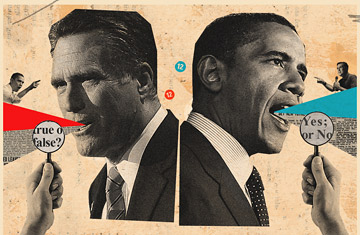
The 2012 election has not been a great one for the facts, but it's been a banner year for the fact checkers. Outlets like PolitiFact and FactCheck.org have gained more visibility and old-media imitators than ever, with newspapers and TV news adding fact-check segments and awarding "Pants on Fires" and "Pinocchios" like state troopers writing tickets on Labor Day weekend.
Yet the traffic violations keep coming. Scads of fibs, exaggerations and misleading statements have been swept up in the dragnet: a super-PAC ad implying that Mitt Romney was responsible for the cancer death of a laid-off worker's wife, a Republican claim that Barack Obama was ditching welfare work requirements, a charge by Senator Harry Reid that someone told him Romney hadn't paid taxes for years, a boatload of statements from Paul Ryan's vice-presidential acceptance speech.
It's a refreshing change from the old "he said, she said, who you gonna believe?" approach. But has it made our politics any more honest or ennobling? I'd like to tell you it has, but that would be a lie.
Ideally, more-aggressive fact-checking cops should lead to more-honest politicking. But often campaigns don't just ignore fact checkers; they scoff. After being called out widely for the above-mentioned welfare canard, for instance, the Romney campaign, reportedly armed with polling that showed that the attack was working, stuck with it anyway. Said Romney pollster Neil Newhouse: "We're not going to let our campaign be dictated by fact checkers."
Sure, a campaign can be hurt by telling a bald-faced lie, even or especially a less-substantive one. Possibly the most embarrassing fact check of Ryan was when Runner's World magazine caught him shaving more than an hour off his marathon time--not a policy lie but, maybe more damning, a sin against sportsmanship.
Mendacity is flexible, though. If flat-out lies don't fly, there's the weasel word, the matter of interpretation, the conjecture, the wild but irrefutable negative, the lie of omission. Reid's tax charge was total hearsay but, without Romney's returns, impossible to prove or disprove. And when Romney says he won't take God off our coins, he's not saying Obama wants to do that; he's just not not saying it.
So even the most conscientious fact checks can lead to stalemate, with one side claiming vindication and the other bias. Daniel Patrick Moynihan once said, "Everyone is entitled to his own opinion but not to his own facts." In fact-check lingo: only technically true! Sure, you can show me chapter and verse that my guy lied. But you can't stop me from answering that his statement was true "in a larger sense," that someone else lied worse one time--or hey, why are you in the tank for the other guy? Even Runner's World got called a lefty rag for exposing Ryan's marathon fib.
But maybe the biggest threat to fact-checking is when news outlets treat it as extra credit--a sidebar, a news analysis, a segment after the commercial break. Aren't facts part of reporting? For fact-checking to have a fighting chance, it needs to be prominent, integrated into the news and, whenever possible, immediate. Some newspapers have started calling out false claims in the lead story, not a box on page A20. Too often, though, the lie gets a prime-time slot and the truth gets a blog post the next day.
